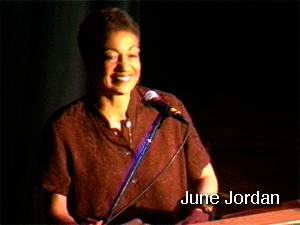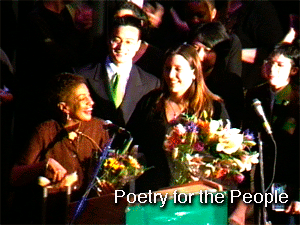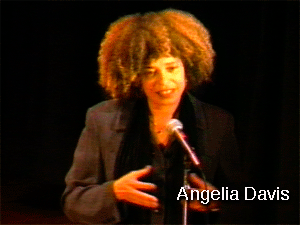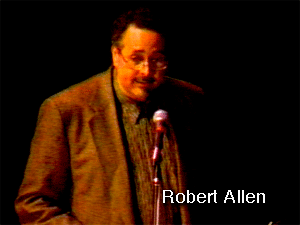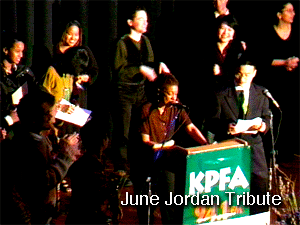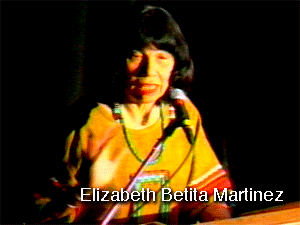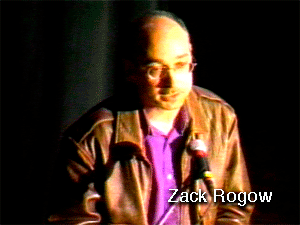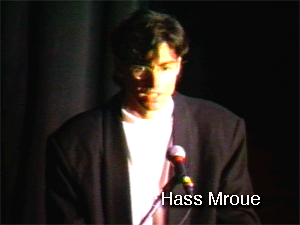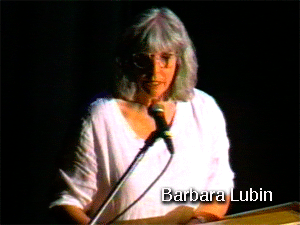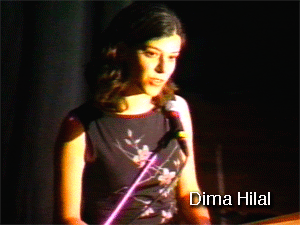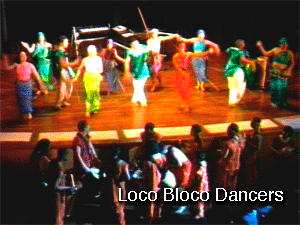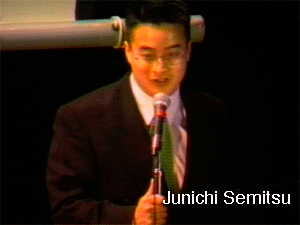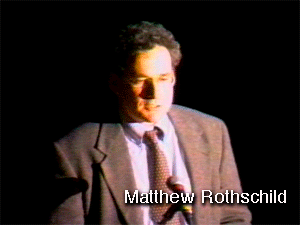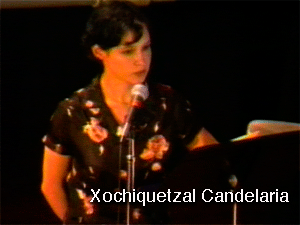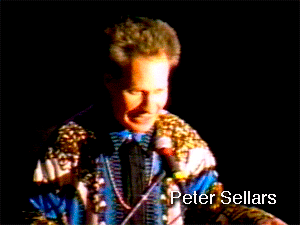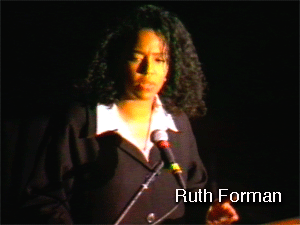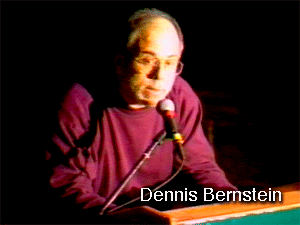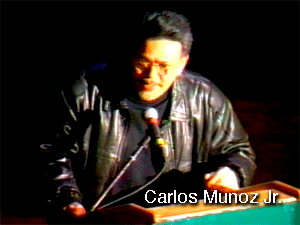
Affirmative Acts - A June Jordan Tribute
Affirmative Acts - A June Jordan Tribute Participants include: Produced by Berkeley Citizen June Jordan reading from her works Affirmative Acts in Berkeley |
June Jordan, 65, Poet and Political Activist
By DinitiaI Smith New York Times June 18, 2002June Jordan, who came of age as a poet when the voices of black female writers were just beginning to be heard, died on June 14 at her home in Berkeley, Calif. She was 65. The cause was breast cancer, which she fought for a decade, said Adrienne Torff, a friend.
Like the careers of Audre Lorde and Alice Walker, Ms. Jordan's was forged by the black arts movement of the 60's and 70's. Her poetry was imbued with advocacy for the poor, for women and the disenfranchised.
In an interview yesterday, Ms. Walker, a close friend, called the small, elegant but tough Ms. Jordan, ''unwillingly nonviolent.'' In ''Poem About Police Violence,'' she wrote about the so-called accidental death of a black man in police custody: ''Tell me something/ what you think would happen if/ everytime they kill a black boy/ then we kill a cop/ everytime they kill a black man/ then we kill a cop/ you think the accident rate would lower/ subsequently?''
Still, Ms. Jordan could be a poet of great delicacy, as in ''On a New Year's Eve,'' in which she describes watching a lover sleep: ''and/ as I watch your arm/ your/ brown arm/ just/ before it moves/ I know/ all things are dear/ that disappear/ all things are dear/ that disappear.''
She was the author or editor of 28 books, essays and novels for children and the libretto for the 1995 opera by John Adams ''I Was Looking at the Ceiling and Then I Saw the Sky.''
She was also a teacher. At the University of California, Berkeley, where she was a professor of African-American Studies, she founded Poetry for the People, which trains undergraduates to take poetry to community groups as a form of political empowerment.
Ms. Jordan was born in Harlem, the daughter of Jamaican immigrants, Granville Ivanhoe Jordan, a postal clerk, and Mildred, a nurse. Ms. Jordan's mother was deeply depressed and eventually committed suicide.Her father had wanted a boy and referred to her as ''he.'' In ''Soldier: A Poet's Childhood'' (Basic Civitas Books, 1999) she described being brutally beaten by him: ''Like a growling beast, the roll-away mahogany doors rumble open, and the light snaps on and a fist smashes into the side of my head and I am screaming awake: 'Daddy! What did I do?!' '' Yet her father helped forge her identity as a writer, she said, giving her books by Paul Laurence Dunbar and forcing her to memorize Shakespeare.
In a radio interview two years ago, Ms. Jordan appeared to have come to terms with her father. She said: ''He didn't know what to do to try to provide against the failure of his only child in this new land. I think that probably contributed to the violence of his frustration. But that he loved me and thought me capable of anything and everything there was never any doubt.''
After the family moved to Brooklyn, Ms. Jordan became the only black student at Midwood High School. Later, she won a scholarship to the Northfield School for Girls in Massachusetts, now the coeducational Northfield-Mount Hermon School.After Northfield she attended Barnard College in New York City where she met Michael Meyer, a white student. The couple married and had a son, Christopher, who lives in Montana.
In her book of essays, ''Civil Wars'' (Scribner's, 1996), Ms. Jordan wrote of the difficulties of an interracial marriage. In 1966 the couple divorced. She raised her son largely on her own, struggling to eke out a living as a freelance journalist. She was a researcher and writer for Mobilization for Youth in New York, and in 1967 she got a teaching job at City College. Two years later she published a children's book, ''Who Look at Me?'
To the end, she remained involved in politics. In September Basic Civitas books is scheduled to publish ''Some of Us Did Not Die,'' which contains essays on Israel, Islam and O. J. Simpson. The book's title is from a poem she read last year in a speech at Barnard. She spoke of her battle with breast cancer and about the Sept. 11 terrorist attacks, which she said proved the need for a secular democracy that protects the rights of ''male/ female/Jew/ Gentile/ Muslim.''
She read from a poem in which she imagined her dying body and a predatory hawk gliding overhead: ''He makes that dive/ to savage/ me/ and inches/ from the blood flood lusty/ beak/ I roll away/ I speak/ I laugh out loud/ Not yet/ big bird of prey/ not yet.''
Berkeley Citizen © 2003
All Rights Reserved
All Rights Reserved
